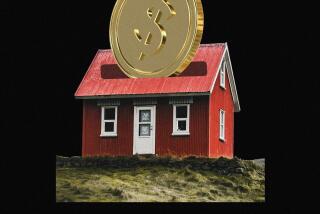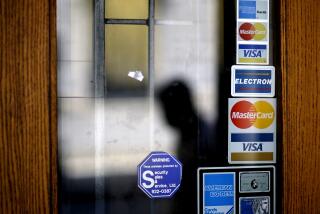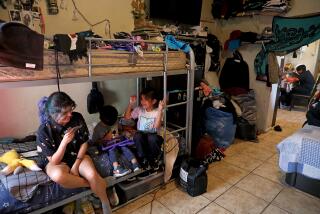Nearly half of U.S. households would struggle with an unexpected $400 expense, Fed study finds
- Share via
Reporting from Washington — Shedding light on the precarious economic state of many American families, the Federal Reserve said Wednesday that nearly half of U.S. households reported they would have trouble meeting emergency expenses of just $400.
In addition, the Fed found that 22% of workers were juggling two or more jobs last year, higher than what government jobs data would suggest. And nearly one out of three Americans said that they have no retirement savings or pension.
These findings were part of the Fed’s “Report on the Economic Well-Being of U.S. households in 2015.” Overall, the survey-based study said the financial health of families continued to show mild improvement last year, with 69% of respondents saying they are “living comfortably” or “doing OK.” That is up 4 percentage points from 2014 and up 6 points from 2013, when the survey began.
See more of our top stories on Facebook >>
But those gains belie the wide gap among households based on differences in education, race and parental wealth -- and the fragile nature of many households’ financial situation more than six years after the end of the Great Recession.
The Fed’s study found that 46% of adults either could not cover a $400 emergency expense or would have to sell something or borrow money to do so. Similarly, 46% of respondents who had a major medical cost last year said they have debt from that expense.
“There is little question that, on the whole, the financial well-being of Americans seems to have improved relative to the prior year and relative to the year before that,” the Fed researchers concluded. “However, the many pockets of consumers who display elevated levels of financial stress and who are at risk for financial disruption in the case of further economic hardships remain a concern.”
The report, based on a survey of more than 5,600 people conducted in October and November, covers a range of topics, including savings behavior, banking and credit access and education debt. And it provides a more detailed look at family pocketbook issues than what can be seen in government data with aggregate numbers and averages.
The report said that the well-being survey results had helped the Fed and other government officials to better understand consumer attitudes, and it will add to the body of research informing the central bank as it weighs policy decisions. The Fed, which raised short-term interest rates in December after keeping it near zero for seven years because of the deep recession and slow recovery, has hesitated to lift rates again this year amid an unsettled global economy and very low inflation at home.
The latest survey paints a generally brighter outlook for workers compared with the prior two years, consistent with the improvement in the job market as unemployment has fallen to 5%. Among nonretired working adults without a disability, 77% said they were confident that they had the skills to get the kind of job they want. That is up 10 percentage points from 2013.
But job readiness, as well as financial condition generally, differed significantly among households depending on education and other factors, reflecting the financial and social disparity in the nation. For example, 31% of adults with at least a bachelor’s degree reported greater financial well-being last year compared with 2014, while 15% reported a decline. For those with a high-school degree or less, 22% said that their financial condition had improved over the last 12 months, while 21% said it had worsened.
Among individuals who went to college, more than half of adults younger than 30 took on at least some debt. And the debt extends beyond just student loans, the report said. One out of four with education debt also have school-related credit card debt, with a median balance of $3,000.
MORE FROM BUSINESS
SeaWorld attendance sinks while other theme parks rise in 2015
Stocks climb for the second day as energy companies jump
U.S. probes e-commerce giant Alibaba’s accounting practices
Follow me at @dleelatimes
More to Read
Inside the business of entertainment
The Wide Shot brings you news, analysis and insights on everything from streaming wars to production — and what it all means for the future.
You may occasionally receive promotional content from the Los Angeles Times.











